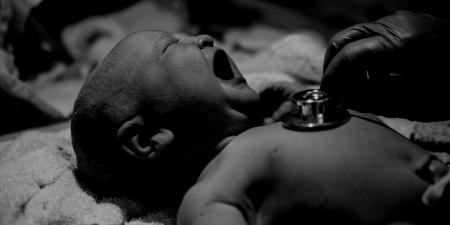Nowadays, a large part of primary care medicine involves the treatment of chronic diseases like hypertension, diabetes, and high cholesterol. Such conditions can be very difficult to manage, especially when they cause their bearers no sensible burden. A seemingly simple plan, some slight diet modification, and a couple of pills a day, for example, can prove nearly impossible to carry through, hence the ubiquity of what is somewhat condescendingly referred to as patient non-compliance. Unfortunately, we have yet to find a way to make ourselves do what we know we should, let alone the key to making others do what we believe they should. Nevertheless, the blame for medical sins of omission, such as failing to take medication or to quit smoking, is most easily placed on the patient.
Anyone who spends time in a Family Medicine clinic will become acquainted with this problem, even a second-year medical student like myself. One day, I met Mrs. Gracia, a friendly Hispanic woman in her mid-50s with a history of diabetes and hypertension, for which she took medication. According to her records, the hypertension was well controlled. The diabetes was another story, however. For as far back as her records went, which was about two years, blood test results monitoring her diabetes had elevated significantly. Not surprisingly, on that day her blood glucose was more than double what it should have been. After looking at the records, I recalled some of the complications of diabetes: neuropathy, heart disease, vision problems, kidney damage, and I rehearsed some pertinent interview questions before introducing myself and asking Mrs. Gracia how I could help her.
Well, she just needed to refill this medicine here and other than that everything was good. She told me she felt great, was active, had been taking her medicine, and had no problems. But good health is so unsatisfying for an eager medical student; perhaps I'd just have to get specific. Fatigue? No. Weight changes? No. Chest pain? No. Numbness or tingling in her hands or feet? No. Vision problems? No. Urinary problems? Infections? Appetite changes? No, no, no. We continued in this manner until I had exhausted every avenue I could think of to uncover a sign of ill health. But she would not budge. In fact, if not for her persistently sky-high lab values, you'd never know Mrs. Gracia had diabetes.
Measuring your blood pressure at home? No. How about your blood sugars? No, she didn't like needles. "But I really don't eat sugar," she added, "You know, that's why I don't get why I have sugar diabetes: I've never been one to eat sweets." At this point, I explained to Mrs. Gracia that she could have too much sugar in her blood even if she didn't eat a lot of sweets, and that people didn't get diabetes from eating too much sugar. She seemed surprised to learn this, but she said she understood. Nevertheless, I remained unsatisfied, and I sensed that the issue had not been settled for Mrs. Gracia either. Surely, I thought, this had all been explained before, probably many times. But then why didn't she get it? And why did I get the feeling that she didn't believe what I had just told her?
Demonstrating the generosity of most patients who participate in medical education, Mrs. Gracia did not object to being seen twice more: once by the resident and myself, and once with the addition of the attending physician. But when questioned the second and third time, both in Spanish, her story remained the same: no problems. She again admitted to not measuring her blood sugar at home, although she claimed to be taking her medications. The physicians were concerned about her lab values, however, and they tried to stress the importance of home monitoring. Mrs. Gracia nodded along and said, "Okay," when told she would have to stick her finger every day to measure her blood sugar. Was she acquiescing or just being polite?
During the third interview, she repeated her puzzlement at the diagnosis of sugar diabetes since she didn't eat much sugar. Again it was explained, this time by the attending physician, that her diabetes was not caused by eating lots of sweets. Surely she understood now. Surely everything would fall into place now that she had been offered this fact with the endorsement of 2-1/2 white coats. But she seemed as surprised to hear it as she had been when I told her the same thing not 20 minutes earlier. Had I not been clear? Or did she just need to hear it from a doctor? Either way, she said she understood.
Perhaps because of my mediocre Spanish skills, my wandering mind, or something else, I'm not exactly sure what happened next, but Mrs. Gracia became angry. It seems the attending physician implied that Mrs. Gracia had been remiss in her treatment. Perhaps she hadn't been taking her diabetes medication or sticking to her diet, because her lab values should not be so high if she were doing as she was supposed to. Her response was surprising. This previously soft-spoken, pleasant woman shouted, "Believe me or don't. But I do not eat sweets!"
I understood this much: that she could have high blood sugar, despite not eating a lot of sweets, had not reached Mrs. Gracia. But how could that be? She said she understood. Maybe she hadn't after all, or maybe she just didn't believe it. Either way, I could practically see that simple fact gasping for life at Mrs. Gracia's feet, lying on the floor between her and the attending physician. For some reason, it simply could not find a place among her worries over meals, work, family, laundry, prayers, bills, etc.
The attending physician reassured Mrs. Gracia that he believed her, but that he was very concerned about her high blood sugar. It was no use. There was no getting beyond the wall that had gone up between the patient and the doctor. Despite the unusually large amount of time spent with her, Mrs. Gracia was not convinced, and now she was angry. She was going to continue with her daily activities as she had before: not eating sweets, not sticking her finger, maybe taking her medication, still not understanding why she had sugar diabetes. Nevertheless, a respectable effort had been made, and the effort would be made again. Meanwhile, other patients were waiting.
Granted, many people manage their chronic conditions very well. But the ones that don't should concern us. As a student, I have been assigned to physicians who seem not to have even one non-compliant patient, while others have more than their fair share. Nevertheless, the key to success remains elusive. Perhaps it lies in a place we are unlikely to look. Most of us are inclined to locate the blame with the burden, that is with the patient, who after all must take the medicine, eat the vegetables, do the exercise, etc. But this is too facile, just as is blaming the physician. In those difficult situations in which it works, managing chronic conditions seems to depend on what exists between the patient and doctor, on a relationship of mutual understanding and reciprocal responsibility. Successfully managing diabetes, hypertension and the like is far more than a simple set of instructions that a patient must follow. It is a process in which both patient and physician are mutually engaged and from which both benefit. In short, the responsibility for managing chronic disease is a shared responsibility. Unfortunately, these are often the hardest responsibilities to fulfill.
Questions for Discussion
Mrs. Gracia does not understand her diabetes, need for treatment, or dietary restrictions. How might a medical student raise concerns about this patient's lack of understanding to her physician, who is also the medical student's preceptor? Given their time constraints, how can physicians make better use of their patients' social support networks and the expertise of other health care professionals in situations such as this?



